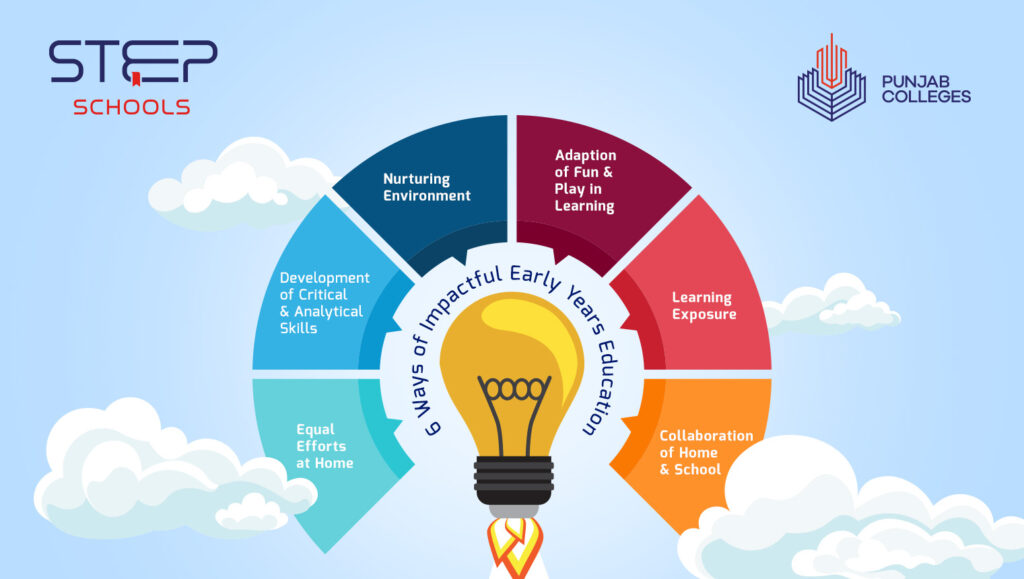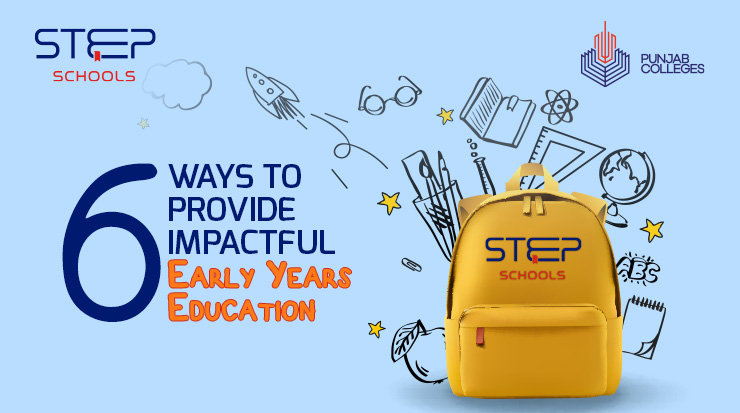The early years of a child’s life are a critical period for development, and providing impactful early years education is essential for setting a solid foundation for a lifetime of learning. High-quality early childhood education can profoundly impact a child’s cognitive, social, and emotional growth and development. In this blog post, we’ll explore six ways to provide impactful early years education that can help children thrive in their formative years.

Create a Nurturing Environment in Home and School
One of the essential aspects of impactful early years education is creating a nurturing and inclusive environment. Young children flourish when they feel safe, valued, and supported. Teachers and parents collectively play a crucial role in fostering this environment by providing warmth and emotional support. Inclusion ensures that every child feels welcomed at schools and valued regardless of background or abilities.
In an inclusive classroom, children learn to respect and appreciate diversity, a valuable lesson that can last a lifetime. Comprehensive early years education also benefits children with special needs by providing them the support and accommodations they require to succeed alongside their peers. Likewise, kids feel appreciated, heard, and appreciated in a nurturing home.
Adopt Fun and Play for Learning
Play is the primary mode of learning for young children. Play-based learning engages children’s natural curiosity and creativity, allowing them to explore, experiment, and develop critical skills. Teachers at STEP Schools design activities and proactive learning experiences that are age-catering and incorporate play as a central element to enhance learning with curiosity.
Activities like building with blocks, role-playing, and sensory exploration allow children to develop problem-solving, social, and fine motor skills. Play-based learning helps cognitive development and leads children to build on social and emotional grounds by learning how to collaborate, negotiate, and express themselves.
Promote Early Literacy and Numeracy Skills
Early exposure to literacy and numeracy skills is essential for a child’s educational success. Encouraging a love for books and stories helps children develop language skills and a strong foundation for reading and writing. Reading regularly aloud to children and providing access to various books can ignite their imaginations and improve their vocabulary.
Similarly, introducing basic numeracy concepts through fun and interactive activities can lay a robust foundation for mathematical understanding. Counting objects, exploring patterns, and playing with shapes effectively build a child’s numeracy skills. Later in the years, these analytical skills become helpful in active and quick learning.
Considering all these elements, STEP Schools offers an introduction to robotics and STEAM education as the comprehensive part of early years education.
Encourage Curiosity and Critical Thinking
Effective early years education should nurture a child’s natural curiosity and encourage critical thinking. Teachers can achieve this by asking open-ended questions, encouraging exploration, and providing opportunities for children to solve problems independently.
Promoting curiosity and critical thinking enhances a child’s cognitive development and a love for learning. When children learn to ask questions, think critically, and seek answers, they are better equipped to face challenges throughout their academic journey and beyond.
Support Social and Emotional Development
Social and emotional development are critical components of early years education. Children need guidance and support to develop social skills, empathy, and emotional intelligence. Teachers can help by providing opportunities for children to interact with their fellow students, resolve conflicts, and healthily express their emotions.
Teaching emotional literacy is crucial, empowering children to understand and manage their feelings. Simple activities, such as storytelling and passionate discussions, can go a long way in helping children develop these vital skills. A strong social and emotional foundation will serve children well in building healthy relationships and managing stress as they grow.
Involve Parents and Caregivers
The involvement of parents and caregivers is a critical component of impactful early years education. A strong partnership between educators and families can significantly benefit children’s development. Parents should be engaged in their child’s education by participating in school activities, attending parent-teacher conferences, and receiving regular updates on their child’s progress.
Collaboration between home and school ensures that children receive consistent support and guidance, reinforcing the skills and values learned in the classroom. Furthermore, it helps parents become more informed about their child’s developmental milestones and how they can support their growth at home.
Parents Can Help in Imapactful Early Years Education
In addition to schools and educational institutions, parents also play a crucial role in early years education. They can help children in the following ways.
Send your children ready and active to school. Ensure they have ironed clothes and a good and nutritional breakfast.
- Teach basic socialising manners. It will help them to move ahead in life.
- There are many other ways parents can help their children get early years education more effectively.
Conclusion
Providing impactful early years education is an investment in a child’s future. Children receiving high-quality early years education are more likely to excel academically, develop strong social and emotional skills, and become lifelong learners. By implementing these strategies, educators, parents, and caregivers can work together to ensure every child can flourish during these critical early years. Ultimately, the impact of a strong early education can be seen in the confident, capable, and well-rounded individuals that children grow up to be.

